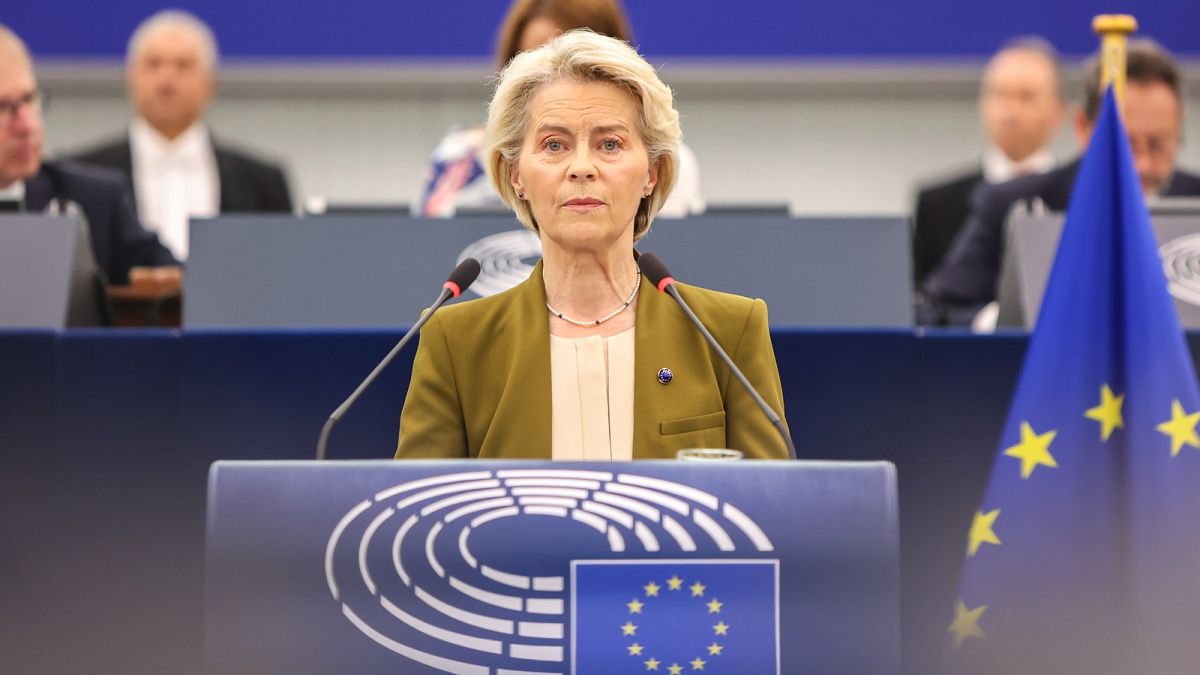Three months after surviving her first-ever motion of censure, Ursula von der Leyen faces not one but two simultaneous attempts to topple her European Commission.
The debate in the European Parliament will take place jointly on Monday at 5 pm CEST, while the votes will be held separately on Thursday at noon CEST.
Though the motions, filed by the far right and the far left, are doomed to fail, they represent a new challenge to von der Leyen’s stay in power and governance style, which has been under mounting scrutiny since the start of her second mandate.
One common thread binds the two bids: the backlash against the EU-US trade deal and the highly disfavourable terms it has imposed on European exporters.
The agreement, which also includes non-binding pledges to spend €750 billion on American-made energy and invest €600 billion in the American market, remains under intense criticism from all sections of the political spectrum.
In a recent poll, 52% of respondents qualified the deal as a “humiliation” for Europe.
Von der Leyen has admitted the agreement is “imperfect”, but insists it is “solid” enough to navigate the commercial turmoil unleashed by US President Donald Trump.
Patriots for Europe (PfE) and The Left, the authors of the respective motions, share another grievance: the EU-Mercosur free trade deal that von der Leyen concluded in December last year and whose legal texts are now up for adoption. Both political groups raise concerns about the potentially damaging impact on European farmers.
They also equally lambaste von der Leyen’s lack of transparency, already a prominent theme in the July attempt.
On the rest, they differ. The Patritos complain about the Commission’s handling of irregular migration and “misguided” green policies, whereas The Left assails its “failure” to address the climate and social crisis, and Israel’s war on Gaza.
Last month, von der Leyen proposed to partially suspend the EU-Israel Association Agreement, a move long advocated by progressive lawmakers. Approval now depends on member states, who have not yet found a qualified majority.
“The plan is to topple the Commission,” said Thomas Shannon, spokesperson for The Left. “It is not the plan to actually create something where we’re constantly bringing this up over and over and over again. I think it’s just very clear that the time is up now.”
Fracture lines
As it happened in July, von der Leyen is expected to survive the votes of no confidence thanks to the support of the three centrist parties: the European People’s Party (EPP), the Socialists and Democrats (S&D) and the liberals of Renew Europe.
The pro-European coalition was fundamental to the Commission chief’s re-election in the summer of 2024, but has since become increasingly strained over the EPP’s informal cooperation with the far right and the big push to simplify regulation.
Despite their stark differences, the centrists agree that the Parliament should not trivialise motions of censure at a time of multiple crises at home and abroad.
“Renew Europe will not play that bi-monthly game,” explained Vincent Stuer, spokesperson for Renew Europe. “We are at risk of degrading an instrument that we might need in much more serious circumstances. This Parliament has other things to do.”
The Greens, which have an ambivalent relationship with von der Leyen, are likely to back her, though some of its members may vote in favour of The Left’s bid.
This means the results on Thursday will fall decisively short of the necessary threshold: two-thirds of the votes cast, representing a majority of 719 MEPs.
In July, the tally showed 360 votes against her dismissal, 175 in favour and 18 abstentions.
Still, the mere existence of the back-to-back motions highlights the political polarisation that von der Leyen faces in her second mandate, on top of economic stagnation, Russia’s war, the Trump administration, Chinese competition and disinformation.
During the July debate, the Commission president hit back against her critics, casting them as “Russian puppets”. But she also extended her hand to reset her relationship with the Parliament and heal the fractures of her centrist coalition.
“I recognise that there are members who may not have signed this motion but who do have legitimate concerns about some of the issues it raises,” she told MEPs.
“That is fair enough. It is part of our democracy, and I will always be ready to debate any issue that this house wants, with facts and with arguments.”
Von der Leyen’s spokesperson confirmed the president would participate in Monday’s plenary debate and “have the occasion to listen to the issues and reply”.
She will be accompanied by the entire College of Commissioners.

